There is a short introduction available for the book of James. You can read it here.
Key Themes (Galatians)
The book of Galatians, written by the Apostle Paul, addresses a crisis in the early Christian community in Galatia, where some were advocating that Gentile Christians must observe the Jewish Law, particularly circumcision, to be fully accepted as believers. Paul’s letter is a passionate defense of the Gospel of grace and a clear articulation of Christian freedom. The key themes include:
- Justification by Faith, Not by the Law: A central theme in Galatians is that justification—being made right with God—comes through faith in Jesus Christ, not by observing the Jewish Law. Paul argues that the Law cannot justify anyone, and that righteousness is given through faith alone. This theme underscores the sufficiency of Christ’s sacrifice for salvation and the futility of trying to earn God’s favor through legalistic practices.
- Christian Freedom: Paul emphasizes that believers are free in Christ from the bondage of the Law. He explains that this freedom is not a license to sin but a call to live by the Spirit and in love. This theme highlights the liberation that comes from the Gospel, freeing believers from the constraints of the Law and empowering them to live in the freedom of God’s grace.
- The Role of the Law: Galatians explores the purpose of the Law, explaining that it was given to reveal sin and to act as a guardian until Christ came. Once faith in Christ is established, believers are no longer under the supervision of the Law. This theme clarifies the temporary and preparatory role of the Law in God’s plan of salvation, pointing to the necessity of Christ’s coming.
- The Unity of All Believers in Christ: Paul emphasizes that in Christ, there is no distinction between Jew and Gentile, slave and free, male and female. All believers are one in Christ Jesus and are heirs according to the promise given to Abraham. This theme highlights the unity and equality of all believers, regardless of their background, and the breaking down of barriers that previously divided them.
- The Fruit of the Spirit: In contrast to living according to the flesh, Paul describes the life of a believer as being characterized by the fruit of the Spirit—love, joy, peace, patience, kindness, goodness, faithfulness, gentleness, and self-control. This theme emphasizes the transformative power of the Holy Spirit in the life of a Christian, producing qualities that reflect the character of Christ.
- Paul’s Apostolic Authority: Throughout the letter, Paul defends his authority as an apostle, asserting that his message and calling come directly from Jesus Christ, not from human sources. This theme is crucial in establishing the legitimacy of Paul’s Gospel message and countering the false teachers who were undermining his authority.
- The Danger of Legalism: Paul warns the Galatians against the dangers of legalism—relying on the Law or human effort for salvation. He argues that returning to the Law after receiving the Gospel is equivalent to returning to slavery. This theme highlights the need to avoid adding legalistic requirements to the Gospel of grace and to trust fully in Christ’s work for salvation.
- The Promise to Abraham: Paul connects the promise made to Abraham with the Gospel, arguing that the promise was fulfilled in Christ. Believers, whether Jew or Gentile, are considered children of Abraham through faith and heirs of the promise. This theme underscores the continuity of God’s plan from the Old Testament to the New, with Christ as the fulfillment of the promise.
- Living by the Spirit: Paul contrasts living by the flesh, which leads to sin and death, with living by the Spirit, which leads to life and godliness. He encourages the Galatians to walk by the Spirit and not gratify the desires of the flesh. This theme highlights the ethical implications of the Gospel, calling believers to a life empowered and guided by the Holy Spirit.
- Perseverance in the True Gospel: Paul exhorts the Galatians to remain steadfast in the true Gospel that they received, warning them against being swayed by false teachings. This theme emphasizes the importance of holding fast to the pure message of salvation by grace through faith and rejecting any distortion of the Gospel.
The book of Galatians is a powerful defense of the Gospel of grace and a call to live in the freedom and power of the Holy Spirit. Through its themes of justification by faith, Christian freedom, unity in Christ, and the dangers of legalism, Galatians provides foundational teachings on the nature of the Gospel and the Christian life, urging believers to stand firm in the truth and live out their faith with love and integrity.
What I Noticed Today (Galatians 1-3)







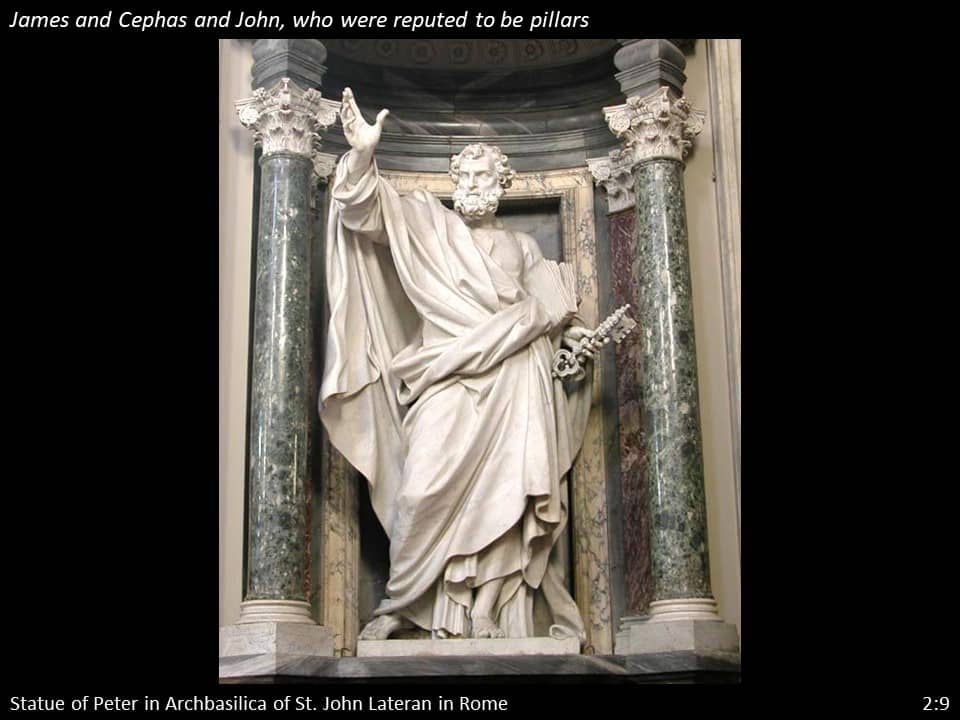
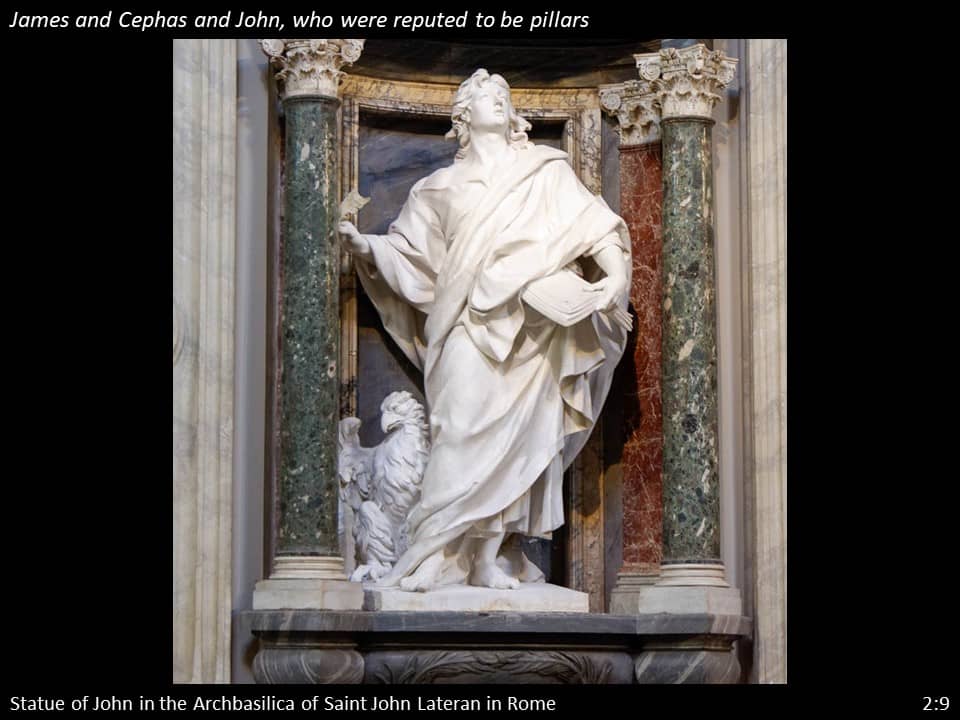

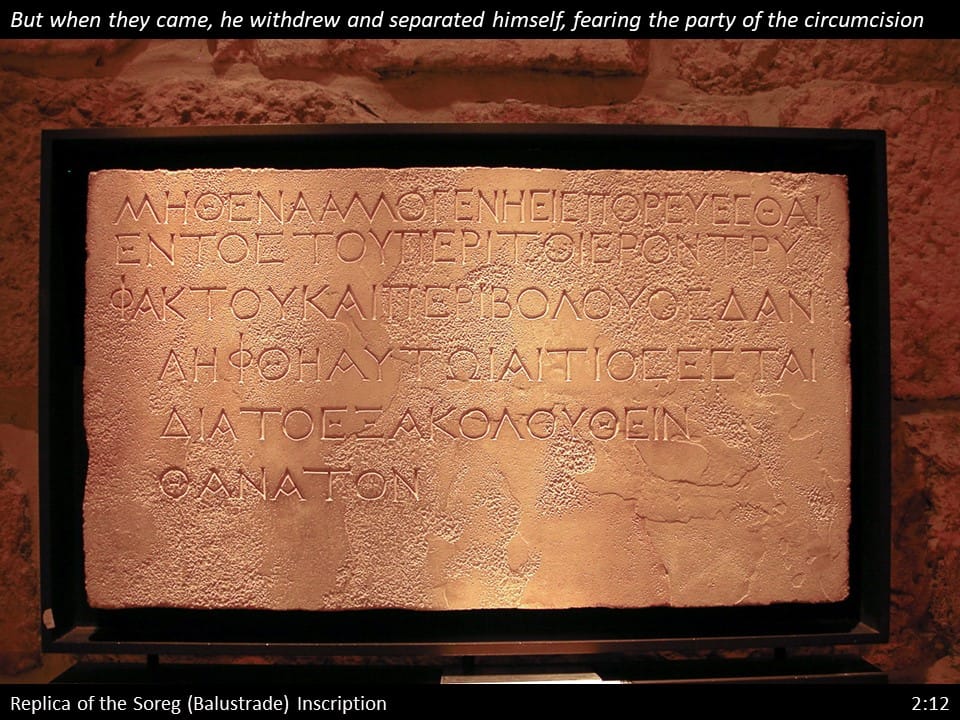

In verses 1-3, Paul’s opening states he is an apostle, not from men or by man, but from Jesus Christ and God the Father. Some people rejected Paul’s authority and his apostleship because he was not one of the original Twelve. Paul makes his claim of apostleship based on being called by the risen Christ and God the Father.
Note: Paul begins the book of Galatians with the usual opening: the author, the recipient, and the greeting. However, he does not include a section expressing praise and thanksgiving for the believers.
In verses 4-5, Paul describes Christ’s work on the cross to rescue us from our sins by the will of God.
Note: Salvation through faith in Christ becomes the theme for much of the book of Galatians.
In verses 6-10, Paul admonishes the Galatians for turning away from Jesus who called them by grace. He accuses some of changing the gospel and says if anyone preaches a different gospel, a curse be on him. Defending his directness, Paul says he is trying to win the approval of God, not men; otherwise; he would not be a slave (servant) to Christ.
In verses 11-21, Paul defends his position as an apostle:
- The gospel Paul preached did not come from man but by revelation from Jesus Christ (probably referring to the Damascus Road experience) (vv. 11-12). How can the Galatians question his authority since Paul’s gospel came from Christ?
- Paul began as a zealous persecutor of the church. A Pharisee, he excelled beyond others because of his zeal for Jewish traditions (vv. 13-14).
- God had called him at birth and set him apart by grace and revealed the Son to him so he could preach to the Gentiles (vv. 15-16a).
- After his conversion, he did not go to Jerusalem to consult with anyone on matters of doctrine but immediately went to Arabia and back to Damascus (vv. 16b-17).
- He waited three years after his conversion before he went to Jerusalem to get to know Cephas (Peter). At that time, he didn’t know any of the other apostles except James, the Lord’s brother (James was the leader of the Christian church in Jerusalem at that time) (vv. 18-20).
Note: Expecting some to question the truthfulness of his claims, Paul swears an oath, “I am not lying, as God is my witness.”
- He then went to Syria and Cilicia. He was unknown to the brothers there, though they heard reports about Paul that the man who once persecuted the church now preached faith in Christ, and because of this, they praised God (vv. 21-24).
Galatians 2












In Galatians 2, Paul continues the defense of his apostleship and ministry, showing how other apostles accepted his message and how he remained true while Peter compromised.
- After 14 years, Paul returned to Jerusalem with Titus and Barnabas because of a revelation from God to go there and preach to the leaders of the church the same gospel he preached to the Gentiles (vv. 1-2).
- Titus was not compelled to be circumcised even though he was a Greek. The issue of Titus’ circumcision arose because of some false brothers (Judaizers) who wanted to impose the Mosaic Law on Christians. Paul said doing so would reduce their freedom in Christ and make Christians slaves (to the Law) (vv. 3-5).
Note: Titus was a Gentile believer, and Barnabas was a Jewish believer.
- After meeting with the leadership, they had no corrections or modifications to Paul’s gospel message. The One who gave the gospel to Paul (for the uncircumcised) also gave it to Peter (for the circumcised) (vv. 6-8).
Note: Those recognized as “important” were Peter, James, and John.
- James, John, and Cephas (Peter) acknowledged the grace given Paul they extended fellowship to Paul and Barnabas. Further, they agreed that Paul and Barnabas should go to the Gentiles, and they would go to the Jews (vv. 9-10).
In verses 11-21, Paul revealed how he had confronted Peter for conduct that threatened the Gospel.
- When Peter came to Antioch, Paul opposed Peter to his face because he regularly ate with Gentiles, but when leaders came from James in Jerusalem, he withdrew, separating himself because he feared the Jews (vv. 11-12).
- Then the rest of the Jews joined in Peter’s hypocrisy so that even Barnabas joined them (v. 13).
- But when Paul saw they were deviating from the Gospel by separating themselves from the Gentiles, he rebuked Peter in front of everyone (vv. 13-14).
- Paul explained Jewish believers know that no one is justified by works of the Law but by faith in Christ (vv. 15-16).
Note: Paul uses the word “justified” for the first time in verse 15. It means to be declared righteous. It is the opposite of being condemned.
- Paul’s opponents argued that because justification by faith eliminated the law, it encouraged sinful living. Paul’s response was, if this were true, then Christ would be a promoter of sin (vv. 17-18)!
- Paul says he has died to the Law so that he might live for God. He has been crucified with Christ, and He lives in him, by faith, in the Son of God (vv. 19-20). Paul’s emphasis here is on the believer’s union with Christ.
- Paul refused to set aside the grace of God because if righteousness comes through the Law, then Christ died for nothing.
Note: Paul’s comments, directed at Peter’s behavior, suggest that Peter is rejecting God’s grace by returning to the Law.
Galatians 3-4
The focus of Galatians 1 & 2 was on Paul’s credentials as an apostle and the issue of hypocrisy among leaders. In Galatians 3 & 4, Paul turns his attention directly to a defense of the doctrine of justification by faith.
Galatians 3
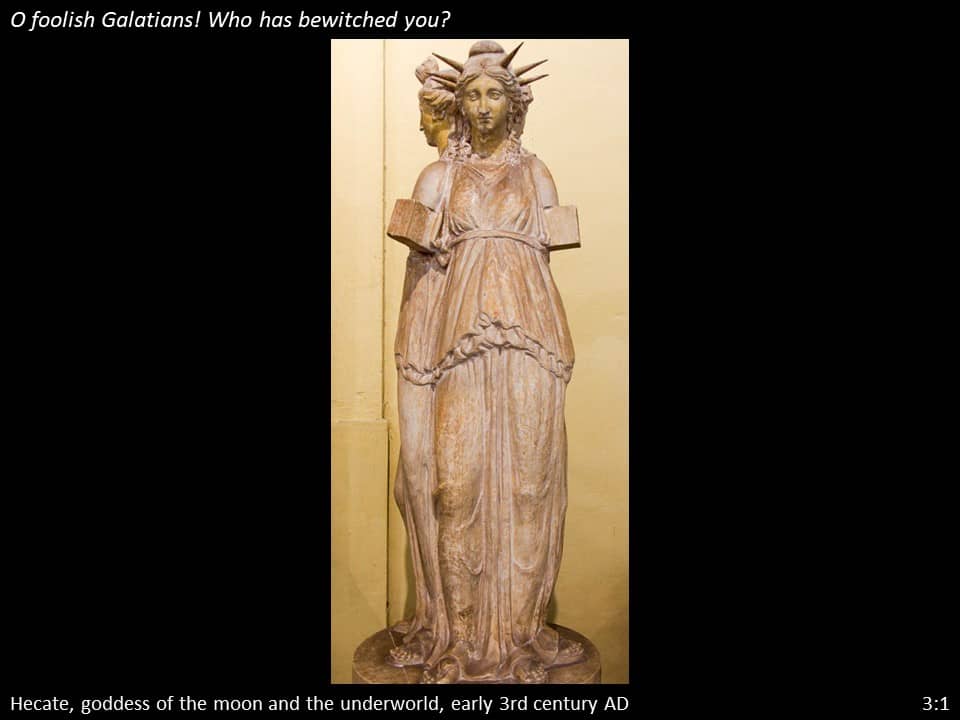

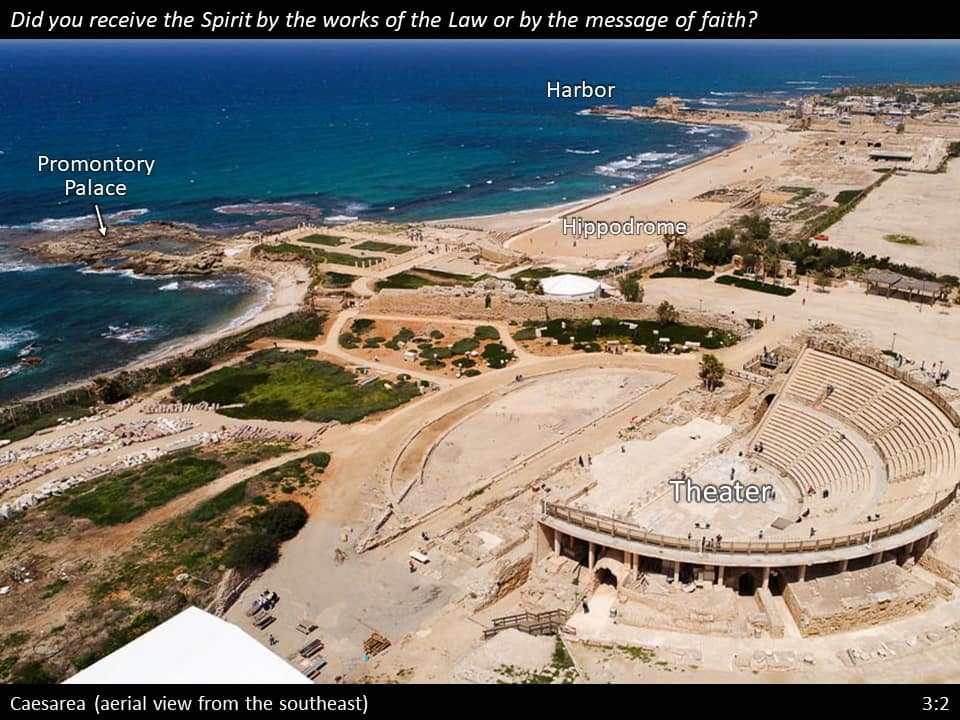

In verses 1-5, Paul is both direct and stern, with the Galatians referring to them as foolish. He wonders who has hypnotized them to reject the teaching of Christ crucified. Paul asks four questions:
- How did you receive the Holy Spirit? Was sit from the Law or by Faith? (v. 2)
- How will you be sanctified? How can you become a Christian by faith and then become spiritually mature by obeying the Law? (v. 3)
- Did you suffer in vain? Paul and Barnabas warned them they would suffer persecutions. (v. 4)
- How does God work miracles among you? Does God give you the Holy Spirit and then work His miracles through works of the Law or through faith? (v. 5)
In verses 6-9, Paul reminds the Galatians that Abraham believed God, and it was credited to him as righteousness (Genesis 15:6). God planned in advance that Gentiles would be justified by faith and even told Abraham nations will be blessed through him (Genesis 12:3). So believers are justified by faith just as Abraham was.
Note: Paul is building his argument on the authority of specific Scripture and what God says, not what is simply his opinion.
In verses 10-14, Paul argues it is illogical to rely on the Law for justification.
- Everyone who relies on works of the Law is under a curse (Deuteronomy 27:26). No one is justified by the Law; the righteous live by faith (Habakkuk 2:4). (v. 10-11)
- Leviticus 18:5 states a person under the Law must follow the statutes and rules. Perfection is required under the law, so faith and Law do not go together. (v. 12)
- Christ has redeemed us from the Law (Deuteronomy 21:23). (v. 13)
- The purpose of Christ’s work on the cross was to bring the blessing of Abraham to Jesus Christ so that we could receive the Holy Spirit by faith, not by works. (v. 14)
In verses 15-18, Paul illustrates the logic of the argument he has just made, saying no one modifies or adds conditions to a human covenant already made.
Note: A Roman covenant or will could not be set aside easily. Paul’s point is God’s covenant with man is unchangeable (except by God).
Therefore, the Law given to Moses 430 years after Abraham does not revoke the promise (covenant) God made with Abraham. The inheritance (eternal life) does not come from the Law but through the promise God made to Abraham.
In verses 19-26, Paul focuses on the purpose of the Mosaic Law. Paul begins asking why the Law was given:
- The Law was given because of the transgressions (sins) of man.
- The Law was in effect until the Seed (the Messiah) came.
- The Law was put into effect through an angel as a mediator.
- A mediator is not for one, but God is one. The Abrahamic covenant was a promise given unilaterally by God; no mediator was necessary.
- If the Law had been able to save (give life), then righteousness would come through the Law. But Scripture says the whole world is a prisoner to sin (Deuteronomy 27:26).
- Paul compares the Law to a jail cell; before faith, we were condemned by the Law. Next, Paul suggests the Law is like a guardian until Christ came so that we could be justified by grace.
Note: The word translated “guardian” was a slave who took care of a young person until they came of age and could care for themselves.
- But, since faith did come, we are no longer under the control of a guardian because we are all sons of God through faith in Christ.
In verses 27-29, Paul switches from the first person to the second person directing these comments specifically to the Galatian believers. For all those who have been baptized into Christ, there is no Jew or Greek, no slave or free, all or female; we are all one in Christ.
- We have become sons of God.
- We are all one in Christ Jesus.
- Believers are heirs of the promise to Abraham (salvation through faith).
Some additional thoughts for consideration:
- Paul’s focus in the letter to the Galatians is on the Judaizers who want to supplement the Gospel message of salvation by faith with the addition of works of the Law. Do we do this today by placing additional requirements on people after they accept Christ as their personal savior?
- The purpose of the Law was to make us aware of our sins so we would recognize God’s grace of salvation through faith in His Son, Jesus Christ.
What did you notice in your study today? Feel free to visit the website and leave a question or a comment.

